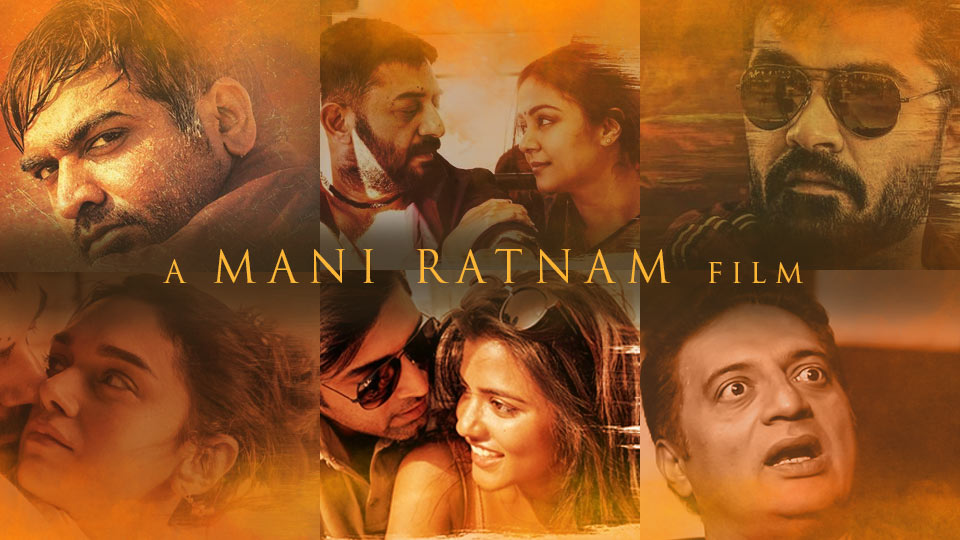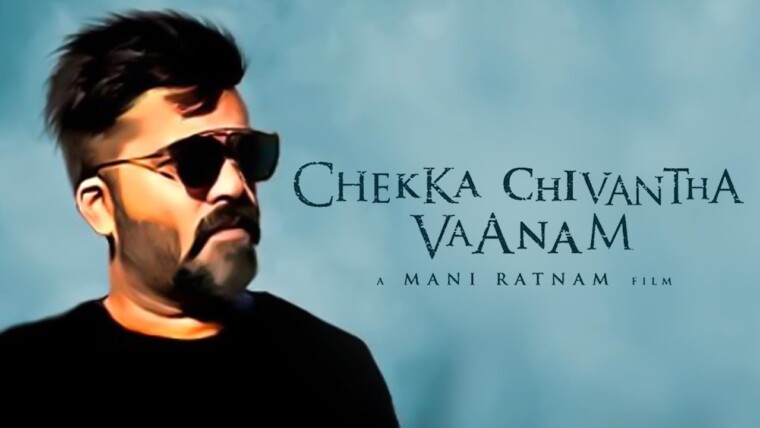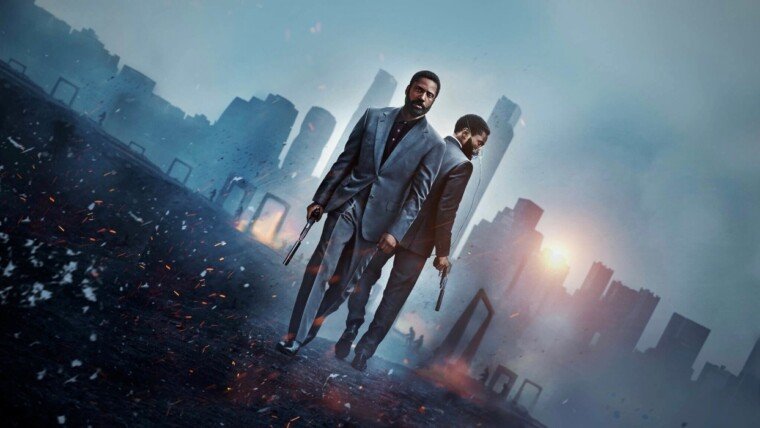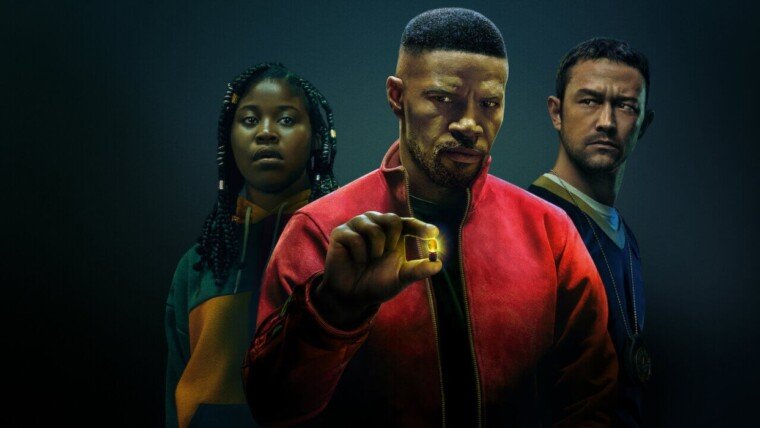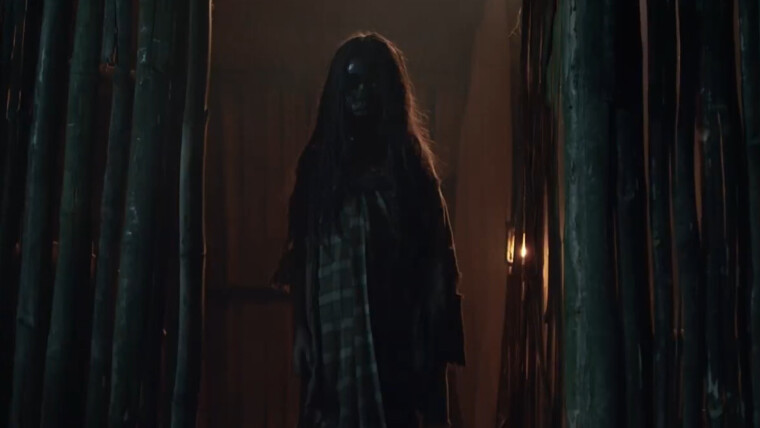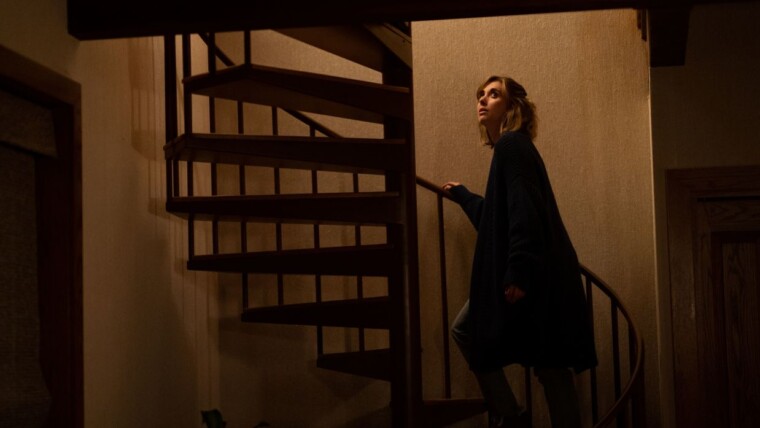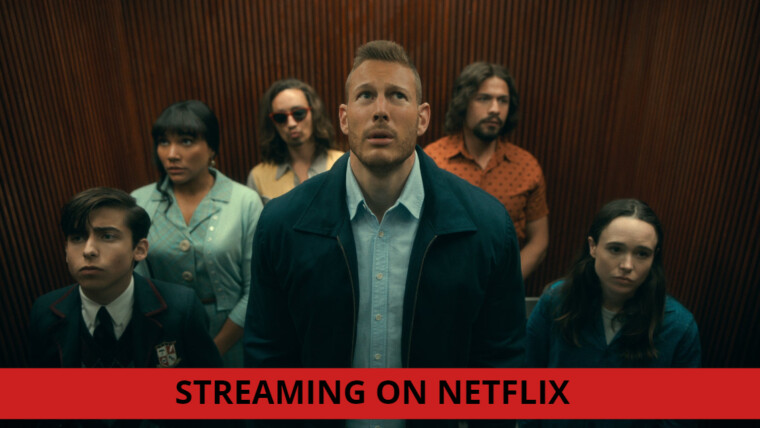My eyes were glued to the screen at the end of Mani Ratnam’s Chekka Chivantha Vaanam, transfixed by the beautiful end credits sequence, processing what I just saw, processing my feelings (or non-feelings. This, is not a feelings type of movie). I then whipped out my phone, clicked on the Whatsapp icon, typed in the letters ‘p.a.p.p.a’ in the search bar and wrote a single word: fascinating. And then hit send. Anyone who knows me would wonder if an alien had come down to earth and abducted Dashran Yohan and replaced him (me) with a doppelganger. You see, I’m the kinda retard (am I not allowed to use this word anymore?) whose friends have made ‘dashran is typing’ memes because I just won’t shut up, especially when it comes to matters concerning life-altering situations such as cinema and film and movies. I don’t do one-word nonsense, much to the annoyances of everybody around me. Frankly, my wheels are still spinning. Hopefully, as I sit my ass down and put my thoughts to paper the backend of WordPress, I’ll attain clarity.
Chekka Chivantha Vaanam opens with a voiceover (slightly longer than the one we hear in the trailer) detailing one of the biggest crime-families in India. Senapathi (Prakash Raj), the aged leader of this gang isn’t the central character of the film. That position goes to his three sons. Varadan, the eldest, played by Arvind Swamy — he has a good buddy, a police officer by the name of Rasool (Vijay Sethupathi); Thyagu (Arun Vijay), the middle child; and Ethi, the youngest of the three brothers, embodied by STR. Senapathi also has a daughter. I will say nothing more about her for now. All hell breaks loose when Senapathi and his wife Lakshmi almost bite the dust (oh, C’mon! This ain’t a spoiler. It was fairly obvious from the trailers) from an attempted hit. The question is, who did it? Was it a rival gang or one of the brothers? And who of the three egoistic brothers would be the next king?
Arvind Swamy is stellar as Varadan — heck, the performances are stellar all around — who’s the hothead of the family. His answer to everything is a bullet through the chest. Both Thyagu and Ethi are abroad, going about their business (with their father’s money of course) in different countries. One has dealings with the Sheikhs in Dubai on boats packed with bikini-clad women, much to his wife’s annoyance. The other deals drugs and guns in Serbia and Russia, with his girlfriend. Ethi is the standout among the brothers. He constantly mouths his words sarcastically, but there’s an underlying pain in his voice. He thinks he’s the vendade paiyan (the youngest of the brothers… the unwanted child).
Vijay Sethupathi is also excellent. He brings his usual Vijay Sethupathi-isms and lite comedy to the mix. But Rasool isn’t a comic relief. He’s caught in between the brothers who have gone to war. Thyagu, the least interesting of the lot, is a man with big dreams. He wants his family business to go international, only Varadan isn’t interested to hear what he has to say. Arun Vijay brings the right amount of suaveness to the character.
I find it fascinating that the only character who lights up a cigarette in the movie is a woman. She isn’t demonized for it — that scene plays out as a matter of factly, as it should. I have always loved the women in Mani Ratnam’s films. Even in a purely testosterone driven film like this one where the women recede into the background, they’re still interesting characters (as opposed to the cookie cutter dancing cardboards they are in most mainstream Tamil films). Even the ones who aren’t at all fleshed out, like Ethi’s girlfriend (Dayana Erappa) and Thyagu’s wife (Aishwarya Rajesh) exude personality.

Lakshmi (Jayasudha) is the most nuanced of the female characters, brought to life by Jayasudha who delivers a controlled performance throughout. There is a scene where she sheds a single tear as she hears her sons talking to each other about the almost-assassination that took place. She wears a look on her face that suggests she’s disappointed in what her children have become, but she’s not surprised — it’s partially her fault. It’s a beautiful scene.
And then there’s Senapthi’s daughter. At first, I wondered what the purpose of conceptualizing a daughter character was if she isn’t going to have more than a single line of dialogue? But that I think is exactly the point Ratnam is trying to make. In her father’s eyes, she’s a nobody. In her brother’s eyes, she’s a nobody. She’s just a spec in their male-dominated, ego-driven, blood-soaked world. Who was it that once said that “if there is a God, it has to be a man. No woman could or ever would fuck things up like this.”
Sins of the Father is a recurring theme in the film. We learn early on about Senapthi’s flings and mistresses. Just like his father, Varadan also engages in extramarital affairs. Interestingly enough, we also learn that his fling, Parvati (Aditi Rao Hydari), had a mother who once ran away with another man.
Lakshmi knows about her husband’s flings, so does Jyotika’s Chitra about her husband’s. In a lot of movies, this would be a dramatic angle. But here, the scene where Chitra knocks on the door of Varadan’s side chick plays out almost nonchalantly. It’s not that she doesn’t care that her husband is cheating on her. She does. There is a tinge of awkwardness in the air to reflect this. None of the characters want to be there at that moment. But the interaction Chitra has with Parvati isn’t one that tries to evoke any type of powerful emotion.
The back and forth between the two characters provide one of the most entertaining sequences in the film. In it, Chitra asks Parvati how much her husband gives her every month. To which Parvati replies, “This is my house. Your husband comes here and eats the free food. But he does cook awesome fish curry.” Only in a Mani Ratnam film will the homewrecker be an independent woman. In a later scene, Jyotika sarcastically brings up the fish curry line to tease Varadan. This, I also found fascinating.
Have the women in Chekka Chivantha Vaanam grown so accustomed to the kind of world they operate in, that they’re able to crack jokes about their sexually unfaithful men? Or are they the type of women who from the very start knew about the type of men they were falling in love with and have always been semi-okay with it? Or were these women just forced into these marriages by their family and learnt how to deal with the circumstances? I don’t know. But I do know, that they’re not innocent, not in a conventional sense. In one scene, we see Jyotika sit with Varadan and watch a video of her husband’s henchmen beating the living daylights out of her brothers in law. She doesn’t flinch.
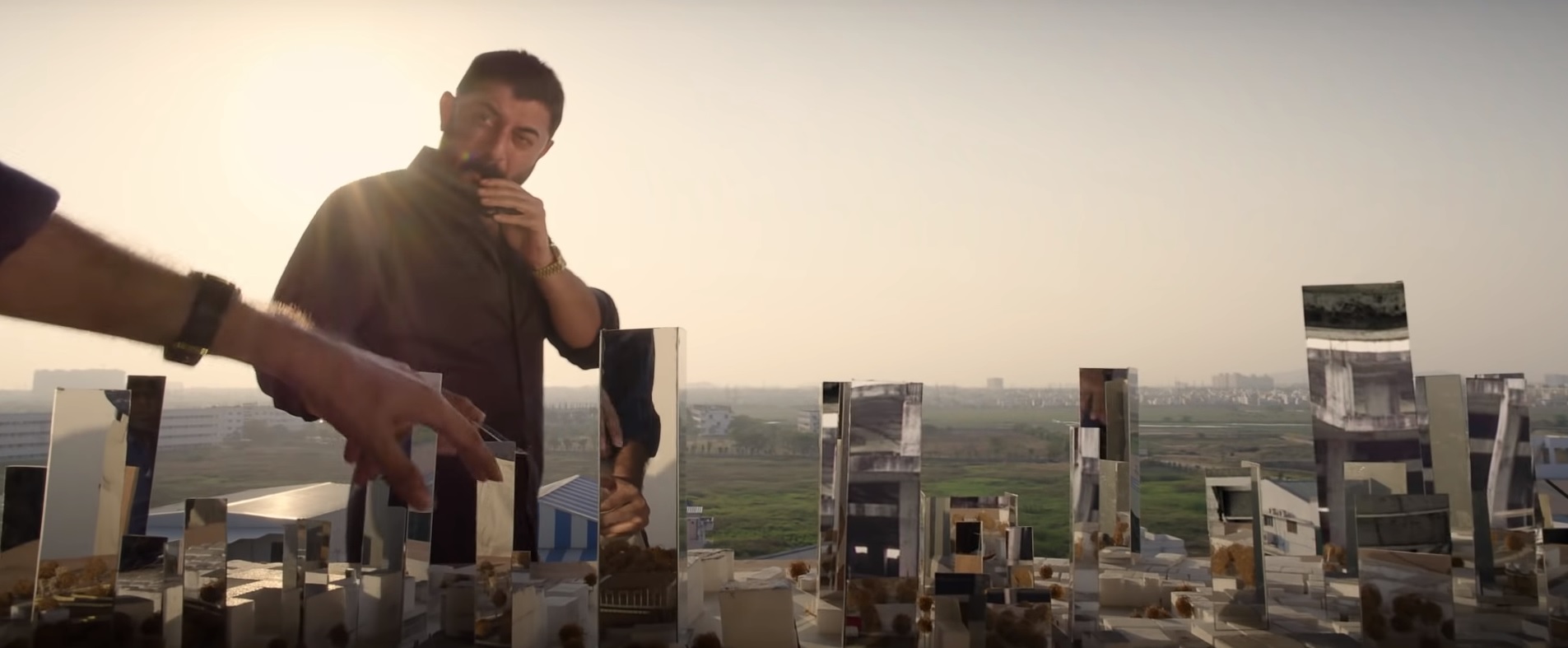
Early on in the film, we get a stunning shot of a mirror being wheeled in front of a man. We assume the man whose back is facing us would be revealed to be a major character — a creative way to stage a mass-y introduction. But when the mirror is wheeled into place, the person is revealed to be complete nobody. Perhaps Ratnam is telling us to expect the unexpected.
There are two more shots involving mirrors or mirror-like objects that happen later in the film. While Varadan has a discussion with a developer concerning the prices of some buildings — the camera pans across the models of these buildings that are made out of some sort of reflective material. Then, in a much more powerful scene, the brothers have a conversation about who might have tried to assassinate their parents. We see their conversation through a mirror. Perhaps Mani Ratnam is trying to emphasize the duality of these characters. The question is, do we care? Well, of course, we do. It’s a Mani Ratnam film. But how much?
How often do you see a film where the characters are mostly fleshed out and compelling, but the dynamic between the characters are non-existent. In The Godfather (the Al Pacino classic, not the Ajith movie), Don Corleone kept his sons (and daughter) close to him. For all their cruelties, the Corleone family are well, a family. And we lived with them, connected to them. We sat with them as they ate Chinese food right out of the takeout boxes. Here, Senapathi keeps (has kept) his sons away. We don’t see the family sitting and eating together because this is the kinda family that eats separately at their own time. It’s also the kind of family where sons don’t attend their father’s funeral. The kind where relatives don’t attend each other’s weddings. It’s as if Ratnam is asking the question what if members of the Corleone family didn’t care for each other? A family void of love, born in blood.
It’s also the kind of family where nobody expresses themselves, where feelings are bottled in and buried deep within their gut. Senapathi tells his wife that he thinks that their dearest of the three sons is the one trying to kill him. To which the wife responds “and which son is that?”Later in the film, Ethi finally breaks and cries for his mother’s love. But in an anti-Thalapathi move, the mom doesn’t cry with him. She says, “are you going to keep me captive?” The ideas that are brimming in this film is as I have repeatedly said… fascinating.
But just like how Senapathi has kept his sons at a distance, Mani Ratnam keeps us at a distance too. Is this by design or a misstep in his effort to breathe life into his screenplay? Given the director’s legendary status, I’d like to think it’s the former; given his recent track record, the latter is very much a possibility. Watching this film felt like I was being tossed into episode five of a ten-part miniseries. We don’t quite comprehend the relationships. Who cares for whom? Which set of characters are close? It feels as though pages upon pages have just been ripped out of the screenplay at random.
We’re nothing but passive observers in this world and therefore the proceedings aren’t always suspenseful. Loads of deaths happen, many of them shocking but are they shocking because we genuinely didn’t expect these characters to die, or they shocking because it’s uncommon to see this many big names bid au revoir in a Tamil film?
Also surprising is the absence of song and dance sequences. Usually, this would get two thumbs up from me. Oftentimes these Masala films have too many musical numbers that feel invasive and in your face. But when done right, it can establish characters and/or drive the story forward in a way a regular sequence can’t. Can you imagine Thalapathi without Illyaraja’s iconic tunes? If you’re looking for a much more contemporary example, the song ‘Thanga Sela’ from Kaala comes to mind. When Kaala bursts into song, Selvi has a WTF look on her face, as if to say she hasn’t seen this side of her husband in years, maybe ever. She’s shy. He’s intoxicated. We see the formerly exiled Lenin flash a smile. It tells us he loves his family dearly and is happy to see his parents enjoy themselves, despite the mounting pressure from their enemies. We see Zareena strike a look that indicates she’s reminiscing the past. We see a lot more than that.
There is a sequence in Chekka Chivantha Vaanam that sets up the opportunity for a musical number as such. I’m talking about the baby naming ceremony that takes place in Senapathi’s mansion. A dance number here could’ve added layers to the family dynamic (who’s standing in the corner on the phone; which of the brothers are dancing, do they tease each other? All while Senapathi has a meeting outside, away from the hoo-hah) while also infusing a masala element and keeping the film uniquely Indian.
That said, as far as the scores and soundtracks go, this is A.R. Rahman’s finest work in years. That Rahman is one of the best composers of our time is no secret. But while his work in recent films like Mersal are catchy and pop-y, here his music feels like a living breathing character in and of itself. It evokes emotions in scenes that would otherwise be emotionally void. I felt shivers creep down my spine!
Chekka Chivantha Vaanam is a fascinating experiment. It’s perfectly shot (Santhosh Sivan’s cinematography will give aspiring DOPs boners for days). The action sequences are well crafted — brutal, bloody and grounded in reality, setting itself apart from the hyper stylised kind you’ll find in most Indian films. There are themes worth salivating over. Every scene is interesting and had me curious. But all throughout, I was waiting for a tissue that connected my soul to the film. It never came. And then there’s that twist. One that makes sense (given the voiceover we hear very early on in the film), but doesn’t pack a punch. Still, I’d take a Mani Ratnam experiment over a generic entertainer all day.
Hey you! Yes you, hot stuff. Like my article? Leave a comment below and let me know whatchu think. Also, don’t forget to share it with your buds. And if you’d like to talk movies with me you can hit me up on Twitter here: @dashtalksmovies

